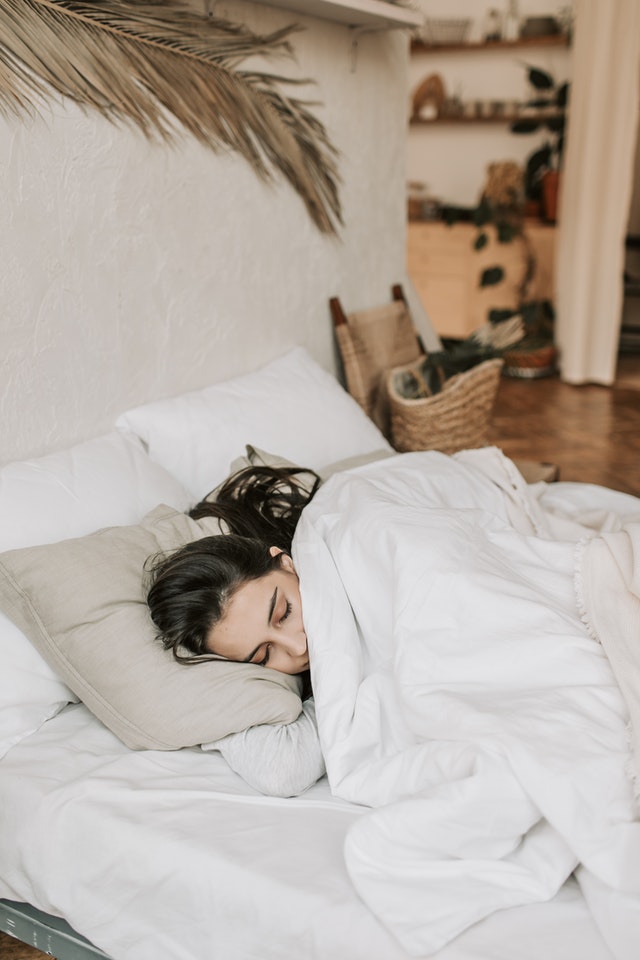Most individuals have trouble sleeping at some time in their life. Sleeping problems have become very common nowadays because of different lifestyles. A person with a sleeping problem cannot focus on daily activities, can develop headaches and irritability, suffer from daily fatigue, and so on.
People with such issues wake up too early or wake up throughout the night. They also need to take a long time to fall asleep. Stress, worry, depression, and job schedules can all impact people’s sleep habits. Infants can also experience sleep deprivation.
Four Reasons for Having Trouble Sleeping
Though there are problems, there are solutions too. By developing good practices, anyone can get rid of such problems. Only six or seven hours of sleep are enough for some people to feel energized. But eight hours of sleep on the other hand is perfect for most people to feel refreshed.
Sleeping difficulties occur when you have problems sleeping at night. You may have trouble falling asleep or waking up multiple times during the night. Four reasons this may be happening. These are:
Insomnia
Insomnia is a frequent sleep condition. You have insomnia if you have trouble sleeping:
- Difficulty falling asleep
- Waking up in the middle of the night
- Getting up sooner than intended
Insomniacs struggle to get asleep, stay asleep, or receive enough restorative sleep. Over time, sleep deprivation can lead to health problems such as diabetes, hypertension, and weight gain. Behavioral and lifestyle changes have positive impacts on sleeping and can improve sleeping patterns. Sleeping pills and cognitive behavioral therapy can also help.
In Adults
A lot of things can cause sleep deprivation, including your sleeping habits, lifestyle choices, and medical conditions. Some reasons are simple and maybe you can handle them at home, while others require medical attention.
Moreover, there are many reasons that can cause sleeplessness. These include aging, too much stimulation before bed (such as watching television, playing video games, or exercising), too much coffee intake, noisy interruptions, an uncomfortable bedroom, or a feeling of excitement.
Disorders
Sleep disorders affect a person’s sleep habits. Another name for this is somnipathy, which is a medical condition. Some people have severe sleep problems that impact their daily physical and mental activities. These also interrupt their social and emotional functioning.
There are different types of sleep disorders in the broader sense. These are dyssomnias, parasomnias, and circadian rhythm sleep disorders. All these impact a person’s sleep time. Medical or psychological factors also cause other sleep disorders. Affecting people who can experience sleep apnea, sleepwalking, narcolepsy, hypersomnia, night terrors, etc.
Obstructive sleep apnea is a sleep condition characterized by the upper airways getting blocked. This causes breathing pauses throughout the night, which may cause you to wake up suddenly, frequently with a choking sound. Snoring is a prevalent symptom of this condition.
Restless legs syndrome can also cause you sleeping problems. This disorder produces unpleasant leg feelings such as tingling or soreness. These sensations cause you to move your legs constantly, even when sleeping, which might disrupt your sleep.
Narcolepsy
Although narcolepsy is not a fatal condition in and of itself, episodes can result in accidents, injuries, or life-threatening scenarios. Furthermore, because of periods of extreme daytime drowsiness, persons with narcolepsy may have trouble holding employment, functioning well in school, and sustaining relationships. While all narcolepsy sufferers are sleepy throughout the day, they may not exhibit all five symptoms.
How to Resolve Trouble with Sleeping Issues?
You can resolve your sleeping issues by following the instructions below:
- Four to six hours before night, caffeine, alcohol, and nicotine should be avoided.
- Exercise five to six hours before bedtime may help you sleep better.
- Eat no more than two hours before going to bed.
- Do not nap after 3 p.m.
- Sleep in a dark, quiet place that is cool.
- If you cannot fall asleep after 20 minutes, do something quiet somewhere and return to bed when you’re tired.
- Relax in the 30 minutes before night by taking a warm bath, listening to quiet music, or reading. A good night’s sleep is essential because of regular exercise and a well-balanced diet.
A lack of sleep, according to a study, has an instant negative influence on your hormones, exercise performance, and cognitive function. To treat insomnia, a few simple actions may be taken. However, this is dependent on the source of your sleeplessness. A doctor for optimal insomnia management depending on any underlying issues you may have.
Conclusion
Wake up and go to sleep at the same time every day. We will feel drowsy at the same time every day once our body has acclimated to a routine of waking and sleeping. For the most pleasing effects, you should stick to it even on vacations and weekends.
Engage in some physical activity. Staying physically active via regular exercise is one of the most effective strategies to fall asleep and sleep well. Try to get comfortable and peaceful when we are on our bed before going to sleep. Before we lie down on our bed, consider what happened throughout the day and record our ideas on paper to relieve tension and anxiety. This might keep your concerns from interfering with your sleep.
You should consult a doctor if you are unable to find relief from insomnia. If insomnia interferes with your personal and professional life, it is best to get expert treatment as soon as possible.













